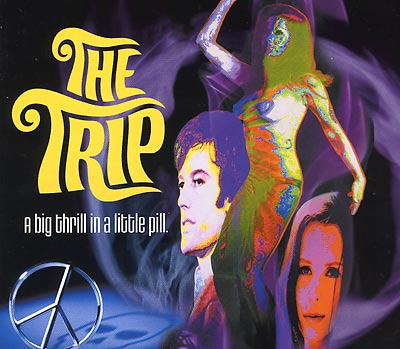The Trip
While many may look at this film and decry the fact that there is really no plot, the truth is that this may be one of the more accomplished efforts by legendary b-movie maven Roger Corman (though that’s not saying much). Intended to be a cautionary tale against the dangers of LSD use, Corman nonetheless took a warped script by Jack Nicholson (based upon his own experiences with the drug as well as his breakup with his first wife), and made something that almost comes across at times as an advertisement for tripping out, where despite the sometimes nightmarish hallucinations we see, the story still plays out that the main character (played by Peter Fonda) somehow “finds himself” and comes out of the experience feeling more free and liberated than he ever has in his life. We are given only sparse details about the Fonda character: He is apparently an accomplished director of TV commercials, and in the midst of a divorce from his wife (the gorgeous Susan Strasberg), whom he is having a tough time separating himself from. One thing I found interesting was in the way his apparent best friend (played by Bruce Dern in a role Nicholson intended for himself, though Corman refused?!) who agrees to act as his “guide” thru the trip, seems to be purposely messing with his head at times, refusing to let him go outside and saying some strange stuff that someone in Fonda’s condition may not need to hear. Eventually Dern leaves the room to get more applejuice, and Fonda runs out of his pad, which is where the movie really gets interesting, as the unattended Fonda wanders into a family’s suburban home, a laundromat where a bored housewife sits eating her food, and a psychedelic bar where he enjoys the music but soon must flee when he sees the cops there possibly looking for him. Corman’s use of rapid fire editing, trippy visuals, and psychedelic music is pretty effective (no surprise since he too experimented with LSD prior to filming) and one wonders if he may have found a niche working in the genre if he had pursued it. It’s also notable that Fonda’s future Easy Rider companion Dennis Hopper appears here as both the paranoid dealer that he gets the acid from as well as some kind of “prosecuter” during a mock trial-type hallucination. The overall theme that Fonda must cut loose the emotional baggage stemming from his divorce is apparent, even if the superimposed shot of cracked glass at the end is meant to imply (unsuccessfully) that the trip was indeed a bad one. In many ways the movie packs everything into one nice package, including medieval torture, and serves as another fascinating time capsule to an era that no longer exists…
7/10
